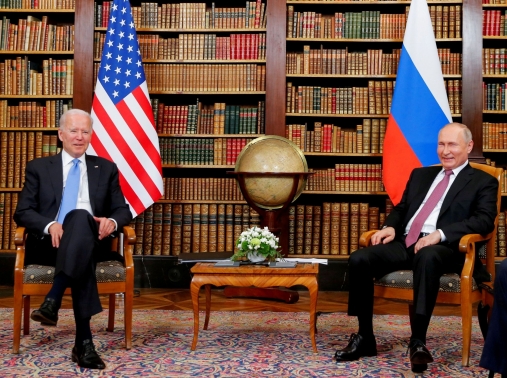|
|
RAND research and commentary on the issues that matter most
|
Feb 3, 2022
|
|
|
|
|
Photo by Pascal Rossignol/Reuters
|
|
|
|
In their confrontation with Russia, the United States and its allies are defending a “dangerously anachronistic principle,” says RAND's James Dobbins: the idea that all Russia's European neighbors should be free to seek NATO membership and that the alliance should be free to incorporate them.
This approach is likely to produce further conflicts of the sort already experienced by Georgia and Ukraine, Dobbins says. “The dangers generated by NATO's open-door policy are directed, in the first instance, at those who take the United States and its allies at their word.”
But Dobbins also notes that abandoning this policy now could be even more dangerous. So what's the solution?
One could imagine an internationally bolstered status of neutrality for Russia's neighbors that do not wish to align with Moscow and have little prospect of securing American-backed NATO security guarantees, he says. Finland, Sweden, and Austria walked a similar tightrope during the Cold War.
However, this would require patient diplomacy and extended efforts to build trust, Dobbins says. This is unlikely while today's crisis persists. Read more »
|
 |
|
U.S. President Joe Biden and Russia's President Vladimir Putin meet for the U.S.-Russia summit at Villa La Grange in Geneva, Switzerland, June 16, 2021. Photo by Denis Balibouse/Reuters
|
|
What have we learned about ongoing strategic competition between the United States and Russia? In a new paper, RAND's Stephanie Pezard synthesizes nearly 60 of our recent reports on Russia, identifying nine major findings. Among them, U.S.-Russia strategic competition likely will be long-lasting, and although conventional war is unlikely, the United States should still prepare for it. Read more »
|
|
 |
|
Photo by SDI Productions/Getty Images
|
|
In recent years, insurance companies and other payers have made efforts to pay physicians based on the quality and value of care they provide. But a new RAND study shows that most physicians who work in group practices owned by health systems are paid primarily based on the volume of care provided. If the way that physicians are paid doesn't evolve, then the U.S. health care system may not be able deliver better value for patients. Read more »
|
|
 |
|
Construction at a subdivision for members of the Biloxi-Chitimacha-Choctaw tribe, who are relocating in response to the effects of climate change, near Shriever, Louisiana, April 7, 2021. Photo by Kathleen Flynn/Reuters
|
|
Despite the large and growing population displaced by extreme weather, there is no common definition of a “climate migrant.” According to Jay Balagna, a Ph.D. student at the Pardee RAND Graduate School, and RAND researchers Aaron Clark-Ginsberg and Vanessa Parks, addressing this oversight is necessary. It's the first step to creating policies to help protect the millions of people who have already been displaced by climate change—and the hundreds of millions more who could follow in their footsteps by midcentury. Read more »
|
|
 |
|
Task Force Warrior staff continue mission planning after a power outage during Hurricane Delta at Fort Polk, Louisiana, October 10, 2020. Photo by Maj. James Sheehan/U.S. Army
|
|
Given its experience over the last two years, the U.S. military is fairly well postured for a deployment during a pandemic. But if the next pandemic is deadlier, the Department of Defense may not be ready to conduct a large-scale operation, say RAND's Michael Spirtas and Stephen Webber. Key steps to prepare include incorporating pandemics into scenarios, growing the medical corps, and increasing biosurveillance capabilities. Read more »
|
|
 |
|
Photo by simonkr/Getty Images
|
|
RAND's Lindsay Daugherty recently reviewed the evidence on earnings gains associated with different types of postsecondary credentials, such as degrees, certificates, and apprenticeships. Daugherty found that most of these credentials can lead to improved earnings. However, gains in earnings vary across types of credentials, fields, and individuals. Learning more about the value of different postsecondary experiences can help individuals, employers, and policymakers make smarter investments. Read more »
|
|
|
You already get the latest insights from RAND in your inbox. Why not your earbuds? Policy Currents is available as a weekly podcast. New episodes every Friday.
Subscribe now »
|
|
|
|
|